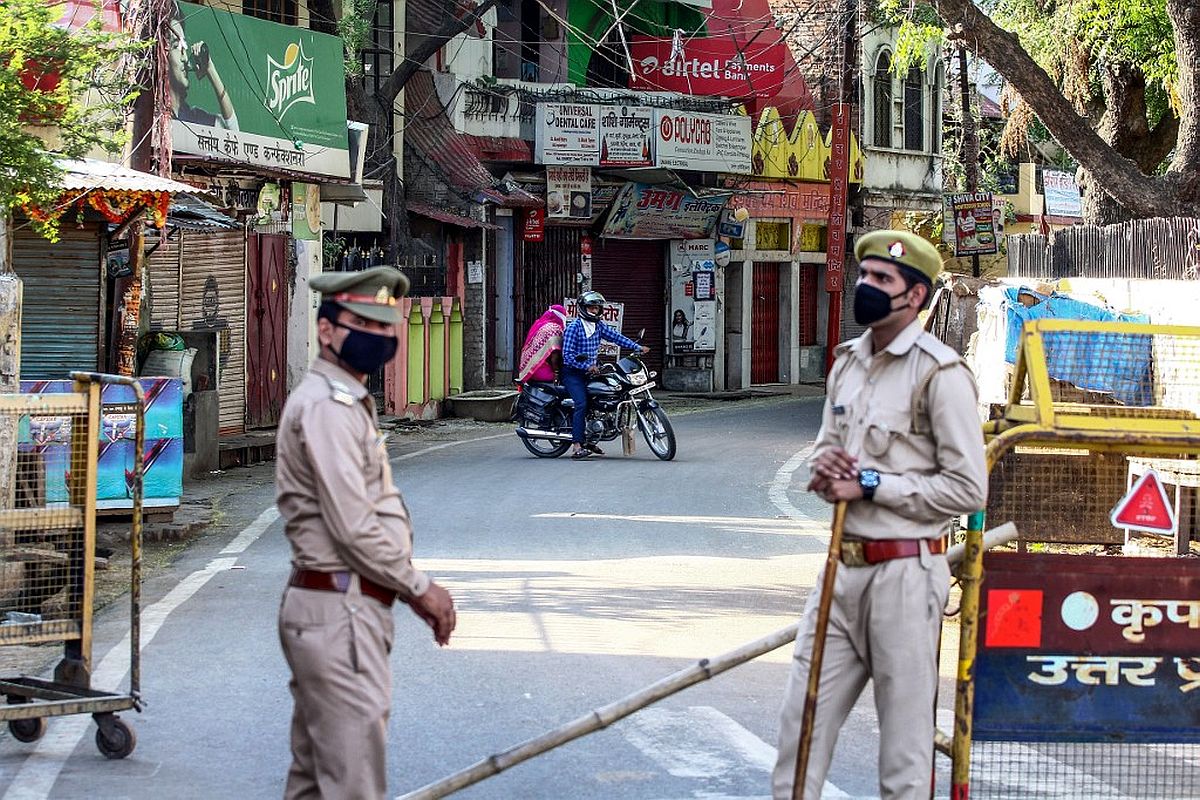Union Minister Amit Shah to introduce bill to amend Disaster Management Act, 2005 in Parliament today
Union Home Minister Amit Shah will introduce a bill to amend the Disaster Management Act, 2005, in both Houses of Parliament on Thursday.
And as each circular carries a grim warning of non-compliance leading to prosecution in terms of the Disaster Management Act and Section 188 of the Indian Penal Code, it also carries with it the risk of draconian interpretation by those implementing rules on ground.

Police personnel block a street in Uttar Pradesh. (Photo: AFP)
It must be said in defence of the bureaucracy that obfuscation has historically been an essential element of official circulars. Having said that, our bureaucrats appear to have outdone themselves while drafting circulars in these times of coronavirus. Little of what is said makes sense at first reading, and some of it not even at second or third.
This explains the clarifications the government has been forced to make virtually every time a substantive edict has been issued. And as each circular carries a grim warning of non-compliance leading to prosecution in terms of the Disaster Management Act and Section 188 of the Indian Penal Code, it also carries with it the risk of draconian interpretation by those implementing rules on ground.
Advertisement
For instance, in comprehending the guidelines issued on Friday on activities permitted in red zones come 4 May, a layperson may be excused for feeling utterly befuddled. The guidelines say movement of individuals and vehicles is allowed for “permitted” activities. It goes on to say that shops selling essential goods are permitted in markets and market complexes.
Advertisement
Non-essential goods are permitted to be sold in standalone shops, neighbourhood (colony) shops and shops in residential complexes. Assuming permission to sell implies permission to buy, does that mean individuals and vehicles can go from one colony to the other to buy non-essential goods?
Add to this the fact that several categories of industrial activity will now be permitted, and that private offices can function at 33 per cent strength, and that up to three persons (including the driver) can take to the roads in cars in pursuit of permitted activities (including shopping), and that Government offices will now function albeit at reduced strength, does this mean police checking will effectively cease in urban areas during the day?
Certainly, the circular suggests this for it says that “the movement of individuals, for all non-essential activities, shall remain strictly prohibited between 7 pm and 7 am”, adding that “local authorities shall issue orders under appropriate provisions of law, such as prohibitory orders (curfew) under Section 144 of Cr. PC for this purpose and shall ensure strict compliance.”
By implication, there would seem to be no bar on movement between 7 a.m. and 7 p.m. if it is in pursuit of permitted activities. City and state administrations would be well advised to seek clarification on the intent of the Central government and issue instructions accordingly, for if this is not to be the case, and police check-posts are to remain, the circular empowers the beat constable in a manner that he or she cannot reasonably cope with.
Any attempt at verification of permitted activities will lead to the kind of chaos being seen on the borders of Delhi with Haryana and Uttar Pradesh after sealing directions were abruptly enforced by the capital’s neighbours after having effectively binned the concept of the National Capital Region. Citizens sequestered for several weeks are being allowed a degree of free movement. Restraints beyond what are contemplated will only add to their woes.
Advertisement